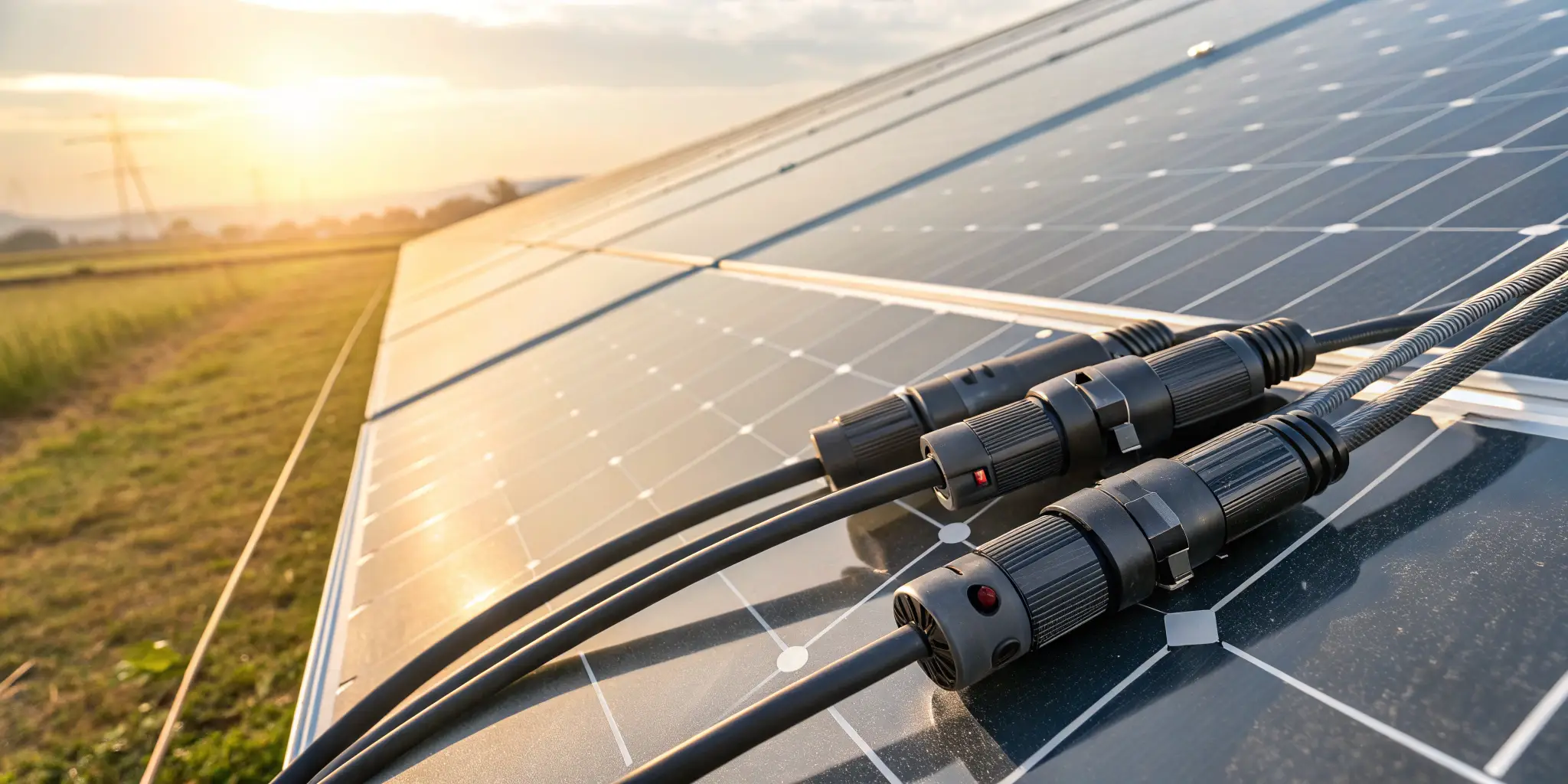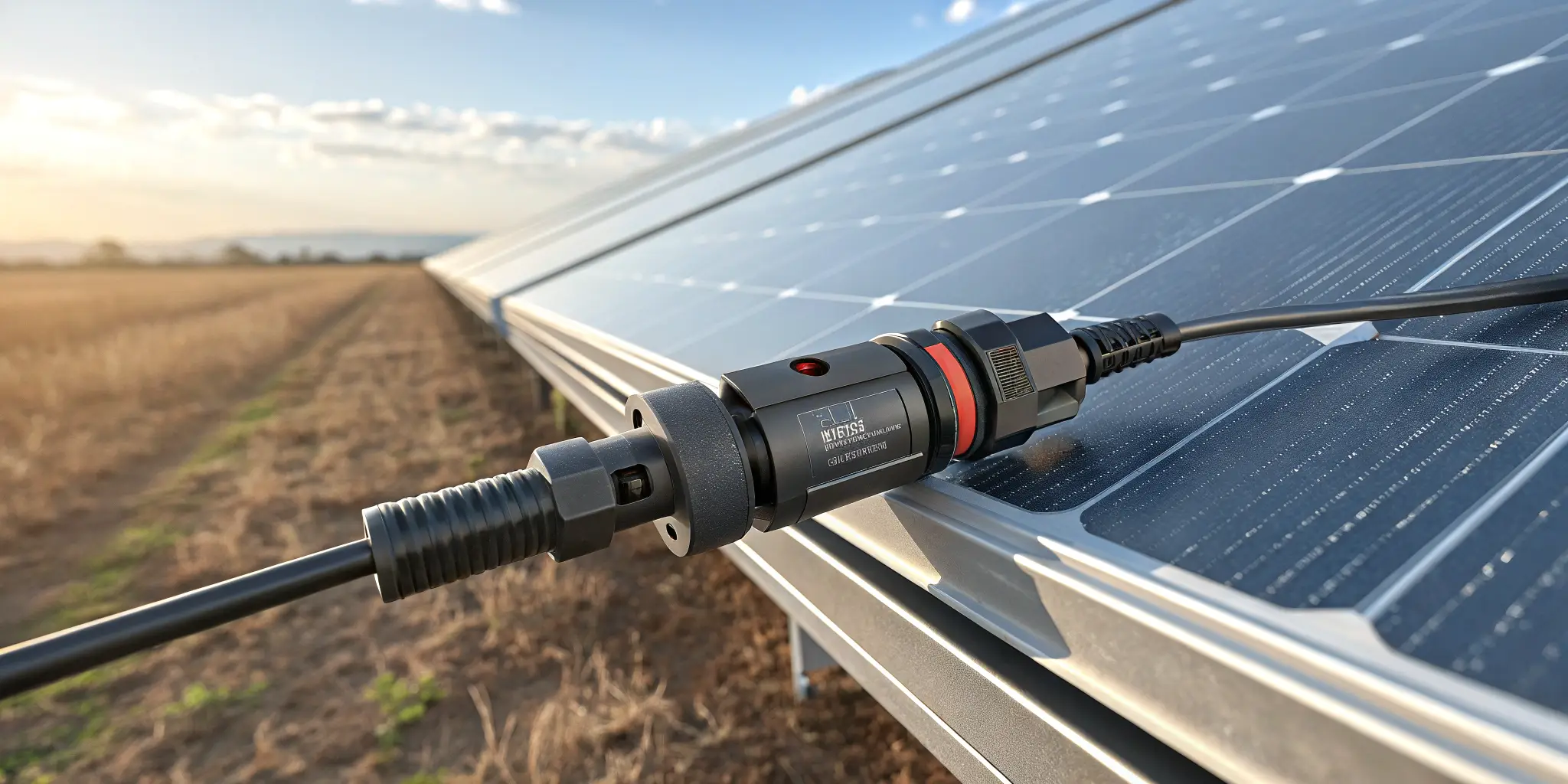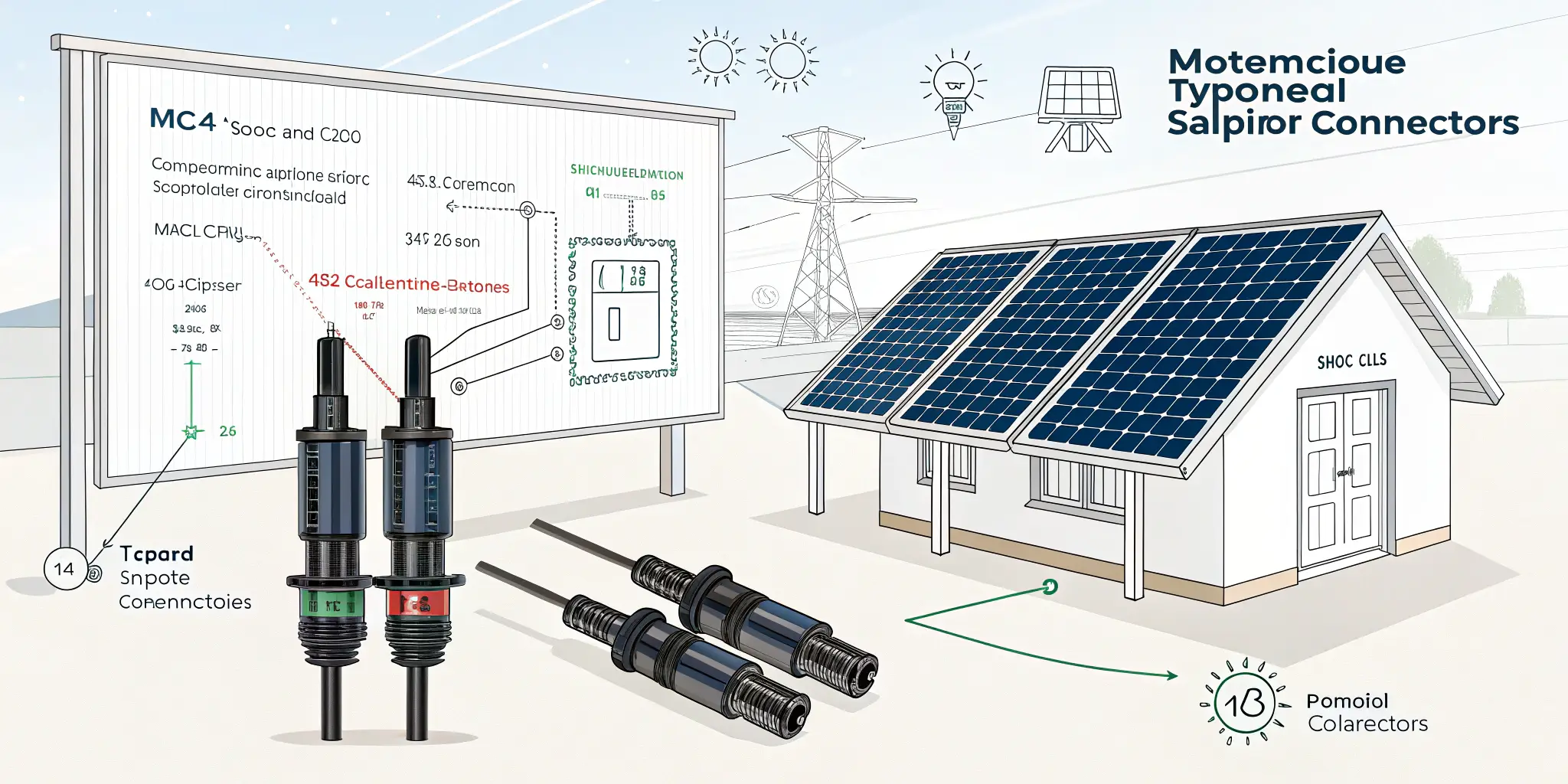What Is the Difference Between MC4 Connectors and Other Types of Connectors?
When it comes to solar power systems, the connectors you choose play a pivotal role in ensuring the system runs safely and efficiently. MC4 connectors are the standard in the solar industry, but are they always the best choice? In this article, we’ll compare MC4 connectors with other types like Tyco and Amphenol connectors, looking at their differences, advantages, and disadvantages to help you make an informed decision for your solar installation.

How Do MC4 Connectors Compare to Tyco or Amphenol Connectors1 in Solar Systems?
MC4 connectors2 are a popular choice for most solar panel systems due to their compatibility, ease of use, and reliability. However, connectors from brands like Tyco and Amphenol offer different features, often tailored to specific needs in high-performance or industrial-grade systems.
Comparison of MC4, Tyco, and Amphenol Connectors:
| Feature | MC4 Connectors | Tyco Connectors3 | Amphenol Connectors |
|---|---|---|---|
| Compatibility | Universal and industry-standard | Typically used in specialized systems | Often used in large-scale, industrial systems |
| Ease of Installation | Simple and fast; minimal tools needed | More complex and requires specialized tools | Moderately complex installation process |
| Cost | Economical | Higher, due to specialized design | High; typically more expensive |
| Durability | Designed for long-term outdoor use | Moderate durability | Very durable, particularly in harsh conditions |
| Performance | High performance in most systems | Often better for high-performance systems | Excellent in demanding applications |
| Applications | Residential, commercial, and small-scale | Large-scale industrial systems, high-efficiency applications | High-end industrial and off-grid installations |
Overall, MC4 connectors are more cost-effective and widely used, making them ideal for most solar installations. Tyco and Amphenol connectors, on the other hand, are often reserved for specific, high-demand applications where performance and durability are critical.
What Are the Key Advantages of Using MC4 Connectors Over Other Connector Types?
MC4 connectors offer distinct advantages over other connector types, making them the preferred choice in many solar systems. These advantages revolve around ease of use, safety, cost, and performance.
Advantages of MC4 Connectors:
- Industry Standard: MC4 connectors are universally compatible with most solar panels and inverters, which makes them a standard choice for solar systems worldwide.
- Ease of Installation: These connectors are designed for easy, quick installation with minimal tools required. This reduces labor costs and installation time.
- Secure Connection: MC4 connectors feature a locking mechanism that ensures the connectors stay firmly in place, preventing accidental disconnections even in windy or stormy conditions.
- Weatherproof: MC4 connectors have an IP67 rating4, meaning they are dust-tight and protected against temporary immersion in water, making them ideal for outdoor installations.
- Safety Features: MC4 connectors are equipped with safety features such as a fire-resistant casing5 and high current-handling capabilities, which help to prevent overheating and electrical fires.
- Long Lifespan: These connectors are built to last for many years, even under harsh environmental conditions, making them reliable for long-term solar panel operations.
These advantages make MC4 connectors a highly reliable and safe choice, ensuring optimal performance in almost any solar application.

How Do MC4 Connectors Ensure Better Safety and Reliability in Solar Installations?
MC4 connectors are designed with the safety and long-term reliability6 of solar systems in mind. They provide a secure and durable connection, ensuring that the entire solar system operates smoothly and without interruption.
Safety Features of MC4 Connectors:
- Locking Mechanism: The patented locking design ensures a secure connection7 that won’t come loose due to environmental conditions like wind or vibrations.
- IP67 Waterproofing: With an IP67 rating, MC4 connectors are resistant to dust, moisture, and water ingress, which significantly reduces the risk of electrical faults.
- Fire-Resistant Materials: MC4 connectors are built using materials that resist high temperatures, reducing the risk of overheating and electrical fires.
- UV Resistant: These connectors are designed to withstand the damaging effects of UV radiation, preventing degradation when exposed to sunlight over extended periods.
- Corrosion Resistance: The connectors are made with high-quality, corrosion-resistant materials to prevent damage from environmental factors such as saltwater or acid rain.
The combination of these features ensures that MC4 connectors contribute to long-term system reliability and safety, making them ideal for outdoor solar installations.
What Are the Cost Differences Between MC4 Connectors and Other Types of Solar Connectors?
Cost is an important factor when deciding between MC4 connectors and other alternatives like Tyco or Amphenol connectors. Let’s take a look at how the cost of MC4 connectors compares to these other options.
Cost Comparison:
| Connector Type | Average Price per Connector |
|---|---|
| MC4 Connectors | $1.50 - $3.00 each |
| Tyco Connectors | $2.00 - $5.00 each |
| Amphenol Connectors | $2.50 - $6.00 each |
While MC4 connectors are generally more affordable, the choice of connector depends on the scale and requirements of the solar installation. For residential and small-scale commercial applications, MC4 connectors provide the best value without sacrificing performance or durability. For larger, more complex systems, Tyco or Amphenol connectors may be necessary, but they come with a higher price tag due to their specialized features and higher-performance capabilities.

How Does the Installation Process of MC4 Connectors Compare to Other Connectors?
The installation of MC4 connectors is straightforward and quick, which makes them especially useful for solar installations where time and budget constraints are a factor.
MC4 Installation Process:
- Strip the wire: Remove the outer insulation of the wire, leaving approximately 12mm of exposed copper for the terminal.
- Crimp the terminal: Using a crimping tool, attach the metal terminal to the wire. Ensure a strong connection8 to prevent loose contacts.
- Insert the terminal into the connector: Place the crimped terminal into the MC4 connector and push it in until you hear a click, indicating the connector is securely attached.
- Lock the connector: Engage the locking mechanism to ensure the connector stays in place, even under high tension or vibration.
Tyco and Amphenol Installation Process:
Both Tyco and Amphenol connectors typically require more specialized tools9 and additional steps. These connectors may also have higher complexity in terms of installation and assembly, making them better suited for large-scale, industrial applications or installations that demand superior performance.
Conclusion
MC4 connectors are the industry standard due to their affordability, ease of installation, and high reliability. While Tyco and Amphenol connectors may offer benefits for large-scale or specialized systems, MC4 connectors offer the best balance of cost, performance, and safety for most residential and commercial solar applications. Whether you are installing solar panels on a roof or in a remote location, MC4 connectors will ensure a safe, efficient, and long-lasting connection.
-
Discover how Amphenol connectors can improve the efficiency and durability of solar installations. ↩
-
Explore the benefits of MC4 connectors to understand why they are the preferred choice for solar installations. ↩
-
Learn about Tyco connectors and their specialized applications in solar systems for high-performance needs. ↩
-
Learn about the IP67 rating to see how it ensures durability and weather resistance for outdoor applications. ↩
-
Discover how fire-resistant casings in connectors can prevent overheating and enhance safety in electrical systems. ↩
-
Understanding long-term reliability can help you choose the best components for your solar system, ensuring efficiency and durability. ↩
-
Exploring secure connections can reveal how they enhance safety and performance in solar systems, crucial for any installation. ↩
-
Learn why ensuring a strong connection is vital for safety and performance in electrical systems. ↩
-
Discover the specialized tools required for Tyco and Amphenol connectors to ensure proper installation and reliability. ↩

